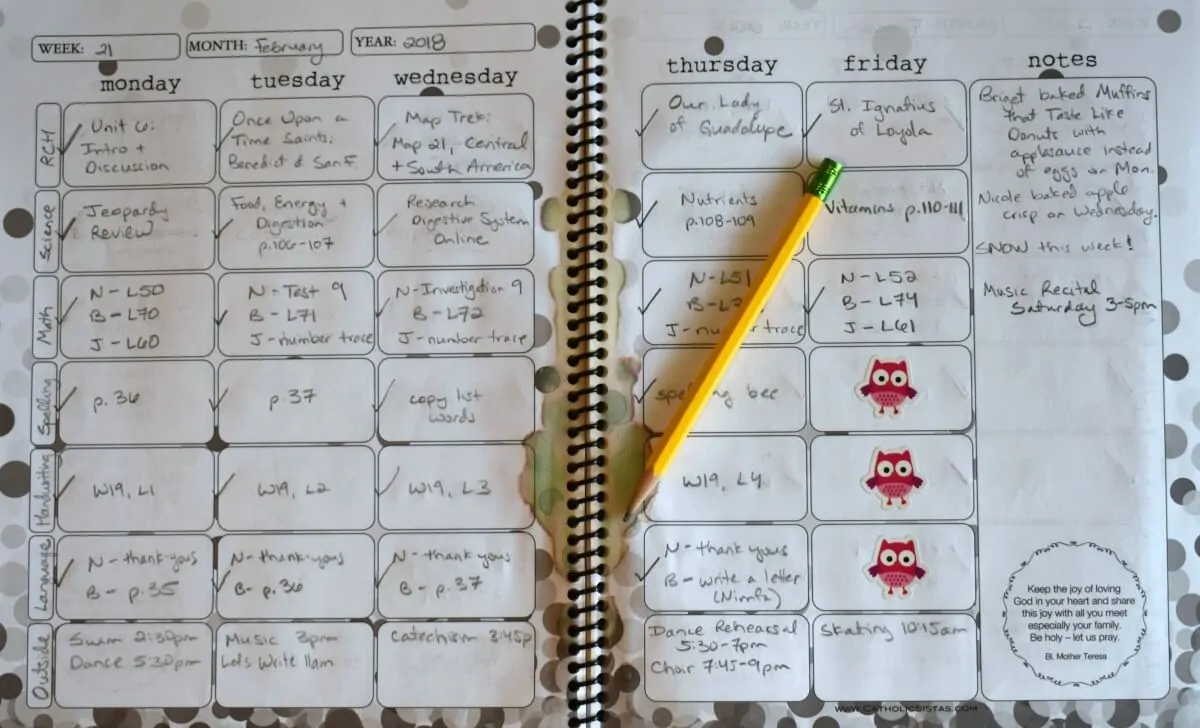This post may contain affiliate links. Read my disclosure policy here.
As the school year wraps up, many of us parents are already looking ahead to next year. You may be thinking about how the last school year went and considering what’s best for your child for the coming year. If you are wondering how to start homeschooling your child next year, you’re in the right place.
Homeschooling is a wonderful educational option for many families and it’s continually growing in popularity. So today we have Bonnie Way, one of our contributors who is a homeschool expert, here to help you learn how to start homeschooling.
If you’re considering homeschooling your child, here’s what you need to know about it…
What Is Homeschooling?
Homeschooling is widely accepted as an educational option across Canada and the United States. Many homeschoolers choose this option for religious reasons, but homeschooling is growing in secular circles as well. Rules and regulations governing homeschooling vary from state to state and province to province. In Canada, some provinces offer funding to homeschoolers and others don’t. You’ll want to look into what support is available locally, and what requirements you need to meet.
I grew up in Alberta in the 80s and 90s, and homeschooled from grades 1 through 12. At the time, homeschooling was relatively new and unknown. My brothers and I often got strange looks when we admitted that we were homeschoolers (and thus done school for the day, rather than playing hooky).
Today, I’m a homeschool mom of five children. My oldest three daughters just completed grades 4, 3 and Kindergarten. Homeschooling is much more common, so my children get smiles and nods when they tell grocery store clerks and bank tellers that they’re homeschoolers. Many of our friends are also homeschoolers, and we are able to take advantage of homeschool classes at various venues around Vancouver.
Why Choose Homeschooling?
Homeschooling is an attractive educational option for a variety of reasons. These include:
- Flexibility — home education allows children to fit their school around other pursuits, such as sports or travel.
- Special needs — parents can meet their child’s individual needs, whether their child requires extra support in an area they are struggling with or should receive extra challenges in an area they excel in. Some kids really hate school because they have ADHD or a learning difference that makes the school environment difficult.
- Faith — many parents choose to educate their children at home to have greater freedom to integrate faith into their child’s day.
- Testing — homeschooling offers a low pressure atmosphere where children can pursue their own interests rather than common core standards and what they need to know to be able to score well on standardized tests.
- Life skills — children in school are often so busy with academics that they don’t have time to learn basic life skills such as cooking or cleaning. While this makes for funny Facebook memes, it also creates dependent adults. Homeschooling lets children be part of home routines and help out more around the home, so they learn these skills before moving out on their own.
- Family togetherness — I’ve found that homeschooling fosters closer relationships between my daughters and within our family, which is more important to me than peer interactions.
- Socialization — yes, this is a reason to homeschool rather than to avoid homeschooling. Homeschooled children often hang out with children (and adults) in a variety of ages, thus learning to interact with people both older and younger than them.
- Peer pressure and bullies — homeschooled children can avoid this negative side of peer interactions within the school system.
- Time — school children spend most of their day at school (although not necessarily doing school); homeschooled children are able to learn the same amount of information in less time, and have more time to pursue other interests.
These are just a few reasons that parents consider homeschooling their children; there are many more. The reasons why families homeschool are as many and as varied as the families who chose this educational option. In the end, each parent must look at their own reasons to make the right educational choice for their child(ren).
How To Start Homeschooling
So you’ve decided that homeschooling is the right education option for your child. Here are some tips to help you get started on this journey.
- Find out what the local government requires of homeschoolers.
Homeschooling falls under provincial or state jurisdiction. You’ll want to do some research to find out what your local government requires homeschoolers to do before starting to homeschool. You need to find out how to start homeschooling in your local area. For example, here in BC, homeschoolers have the option to enroll (and receive funding and support) or register (no funding and no accountability). In PEI, homeschoolers don’t need to do anything but start school.
You can start by googling your state name and homeschooling. For example, when I search for “BC homeschool” in Google, I find the BC Government’s page about homeschooling, the BC Home Educators Association website, and other resources.
- Find support.
Homeschooling is hard. You will need support from other homeschooling moms as you do this, especially when you hit January and it’s no longer new and exciting. If you can, connect with a local or online homeschool group. There are many Facebook groups for homeschool moms that can help you as you are researching how to start homeschooling. You may also find online forums or email groups where you can connect with fellow homeschool parents. Local homeschool events (conferences, meetings, classes) are a great way to meet other homeschoolers in your area.
I also recommend registering with a homeschool board, if they exist in your area. Here in BC, my homeschool board distributes my educational funding (used to buy books and resources for my children). I’m assigned to a support teacher, who can answer any questions I have about my daughters’ learning, offer advice about curriculum choices, and ensure we are meeting provincial standards.
- Choose your curriculum.
This just might be one of the hardest part of your homeschool journey. There is a wealth of homeschool curriculum open to homeschoolers now. Wading through all the options can be overwhelming.
If you have friends who homeschool, I’d recommend sitting down with them to look at their books and resources and ask them what worked for them. I did this with a friend of mine just before my oldest daughter started Grade 1. Her children were a year ahead of mine, so it was a good way for me to see what they’d done. I still snoop through my friend’s homeschool resources for ideas and discovered a great history program this way a few years ago.
If you don’t know any homeschoolers, read online reviews. Many curriculum websites have reviews right on their site. You can also google your chosen curriculum title with “review” to see what comes up. You’ll be able to read about how other homeschool parents used the curriculum and what they thought about it. You can then decide whether the curriculum would suit your child (and your teaching abilities).
If you are new to homeschooling, and don’t have a teaching degree, then I highly recommend choosing a simple curriculum that was written with homeschoolers in mind. I’ve tried curricula that are marketed at homeschoolers but are really intended for use in a classroom with 30 kids, and it’s frustrating to attempt to adapt it to my one student.
I know many homeschool parents who enjoy planning unit studies and coming up with resources for their children, but I’ve found it easiest to buy pre-packaged curriculum where I simply open the workbook to the next page or do what the teacher’s manual tells me to do.
- Determine your homeschooling style.
As you research homeschooling curriculum and how to start homeschooling, you’ll likely come across discussions about homeschooling methods or styles. Names like Charlotte Mason, Montessori, traditional, distance learning, and more may pop up. These can be confusing (even to veteran homeschoolers like me!).
Don’t worry about putting a label on your homeschool. Remember that no two schools look alike; in the school system, there are public schools, private schools, Montessori schools, and more. Homeschools will also look different, and you don’t have to homeschool exactly the way your best friend or favourite blogger does.
If you are drawn to Charlotte Mason methods, great. If not, do something else with your children.
- Stick to the basics.
There are a lot of resources available to homeschoolers these days that you may want use as you figure out your plan of how to start homeschooling. Besides online classes, many local vendors are catering to the homeschool market. It can be easy to overbook your child (or you!) because you get excited about all the options and programs available.
Stick to the basics. What does your child need to learn this year? For me, that means language (reading and writing), math, and science. Choose your core curriculum for these subjects first, and complete these subjects first in your school day.
After that, you can add more. We usually study history (or social studies) as well, but other options include geography, music, second languages, and more.
- Trust yourself.
We moms are often guilty of putting ourselves down, comparing ourselves to other moms, and doubting ourselves. Homeschool moms are even better at all of these. Homeschooling is hard, but the rewards are huge. Trust yourself as you begin this process (and see point 2 again).
You may not have a teaching degree, but you don’t need that to homeschool. What you have that no teacher in the school system has (no matter how many degrees and accreditations they’ve earned) is knowledge of your child. You have been with your child since his or her birth. You know him or her better than anyone else (except perhaps your spouse). That knowledge will help you tailor your child’s homeschool days to their strengths and weaknesses.
There will be good days and bad days. There will be days when your child doesn’t want to do school, and days when they love it. There will be days when they’ll want to go back to school (whether or not they’ve been there before). Trust yourself and your decisions about what’s best for your child. It can help to write out your reasons for homeschooling to reassure yourself that you’re on the right path, even when it gets tough.
- Use a planner.
Whether you’re a planner or a do-whatever-we-feel-like type person, I do recommend keeping track of your school days. If you are at the beginning of your journey learning how to start homeschooling, I can’t stress the importance of a planner enough.
A planner could be a homeschool planner, an ordinary weekly or monthly planner from your local office supply store, or even just a wall calendar. You can write down what you plan to do with your kids or what you’ve done with them.
The planner allows you to track your progress as a homeschooler. If grandma (or your husband) is dubious about what the kids are doing in their schoolwork, you have written proof that you did do school each day. If your province requires reporting to a school board or teacher, your planner will help you look back at what you did and share it as required.
I love my planner. I usually plan a week at a time, but I have friends who plan their school days in six week blocks. I usually sit down on Sunday night or Monday morning and look at our week (and what activities we have going on). Then I look over our books and curriculum and figure out how much school we’ll do each day. I may adjust that plan during the week a bit (I write in pencil in my planner!).
Planning also helps me space our work so that I don’t try to do too much with the kids and burn out. When we started, my main curriculum recommended doing a four-day week, and had recommended lesson plans for me. I’ve used lesson plans whenever possible, as these assure me that we will get through the curriculum in the end of the year (rather than trying to do it all in a month). We also still follow the four-day week, and leave one day a week for mom’s group, field trips, or errands.
- Be patient.
I’ve often heard moms say, “I’m not patient enough to homeschool.” I’m not patient either. Patience isn’t a requirement before you start homeschooling, but it is a virtue to develop as a homeschool mom. Rome wasn’t built in a day, and most students won’t learn long division in a day either.
Be patient with yourself and your children. Learning takes time. It can be frustrating. Kids will make mistakes, and so will you. Remember that this is a long-term project.
- Be flexible.
You likely have some ideas about the time you’ll spend homeschooling, what books and resources you’ll use, how your day will go, etc. You’ll make your plans at the beginning of the school year… and they may fall apart before Christmas.
Be flexible. Homeschooling is a journey. It can be a learning process for the teacher as much as for the student. Maybe the curriculum you chose came with rave reviews but isn’t the right fit for your child. Maybe you got an adorable study desk for your child, but they’d rather do their math while lying on the living room floor. Maybe you planned an amazing homeschool co-op with a friend and her kids, and your kids can’t stand each other.
Take a step back. Chat with your husband or with a homeschool friend about what’s working and what’s not. Decide whether this activity or curriculum is worth continuing or whether you need to change. Maybe a change in routine will help or maybe a bigger change is needed.
- Stay excited about learning.
My mom is a model of a lifelong learner. When I was a homeschool student, she always got excited about what we were learning (even when my brothers and I were less than excited). She earned a B.A. before getting married and having kids, and went back to university after my brothers and I did to earn a B.Sc.
Learning should be interesting and exciting. Too often, “school” is made to seem boring and hard. And while there are some subjects that will be hard (um, math), there are others where we can pursue our child’s interests. I try to balance the “this is work that needs to get done” with “we can have fun learning about this.” I also try to connect our learning with other areas of our life. For example, my daughters don’t like math, but they do like baking and sewing—two interests that require math skills.
Be excited about what your children are learning. Learn alongside them, especially if you are teaching higher grades. And demonstrate to them what it means to be a lifelong learner. “School” isn’t something to plug through until Grade 12, when a child is suddenly “free.” Try to awaken and encourage your child’s curiosity and interests, and pursue them.
Awesome Homeschool Resources
These websites all offer a homeschool newsletter, plenty of articles and reviews, and free printables and resources for homeschoolers:
You can also check out my homeschooling tips and resources.
Happy homeschooling!
Bonnie Way is a homeschool graduate and homeschool mom to four girls and a baby boy. She and her husband grew up in Alberta and currently make their home in Vancouver, BC. Bonnie earned a B.A. in English with highest honours in 2006 (before kids) and completed a B.A. in Writing (after kids) at the University of Victoria in 2014. When she’s not homeschooling or blogging, she can be found reading, hiking with her kids, or trying to learn how to use her new Nikon DSLR.
Pin it for Later












Leave a Comment